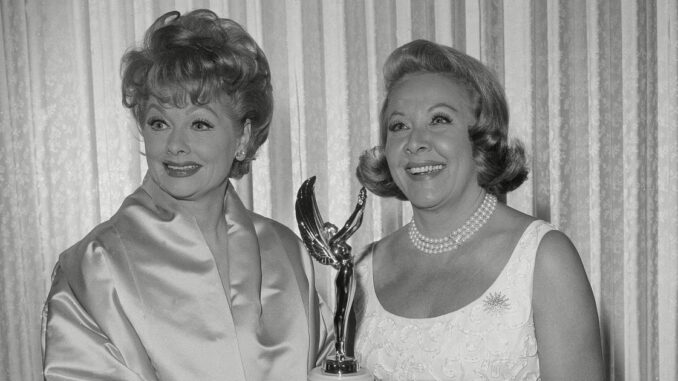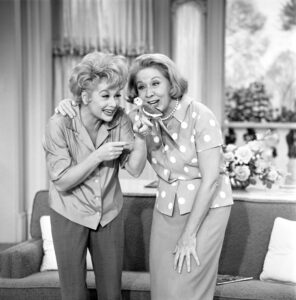
Introduction
Hollywood has always been a place of glitz, glamour—and sometimes, eyebrow-raising demands. One of the most surprising revelations about the classic sitcom I Love Lucy involves Vivian Vance, who played Ethel Mertz, Lucy Ricardo’s best friend. Her contract contained a peculiar clause: she had to weigh at least 10 pounds more than Lucille Ball. But why was this rule enforced, and how did it impact her career and self-esteem? Let’s dive into this fascinating story.
The Backstory: Vivian Vance and Her Role as Ethel Mertz
Vivian Vance became a household name as Ethel Mertz, the lovable and sassy neighbor on I Love Lucy. Paired with William Frawley as her on-screen husband Fred Mertz, Vance brought humor and charm to every scene. But behind the laughter, her experience was shaped by an unusual contractual obligation.
Why the Weight Clause?
The weight clause in Vivian Vance’s contract was designed to maintain a clear visual hierarchy between her character and Lucille Ball’s Lucy Ricardo. Producers wanted Lucy to remain the glamorous and vibrant star of the show, while Ethel was portrayed as the more down-to-earth and slightly frumpy sidekick.
- Perception of Beauty in the 1950s
Hollywood in the 1950s had rigid beauty standards, and actresses were often subjected to scrutiny over their appearance. For I Love Lucy, this meant ensuring that Lucille Ball’s character always looked more polished and fashionable compared to her best friend. - The Power Dynamics Behind the Scenes
While Lucille Ball didn’t personally enforce this clause, the decision reflected the studio’s priorities. It was all about creating a contrast that would enhance the comedic dynamic between Lucy and Ethel.
Vivian Vance’s Reaction to the Clause
Vivian Vance reportedly struggled with the weight clause. As an actress, she wanted to be appreciated for her talent, not judged by her physical appearance. This stipulation added unnecessary pressure and highlighted the industry’s obsession with image over substance.

How the Clause Affected Vance’s Career
- Typecasting as Ethel Mertz
The weight clause reinforced Ethel’s characterization as a less glamorous counterpart to Lucy. While this contributed to the show’s success, it also typecast Vance in similar roles, limiting her opportunities for more diverse performances. - Impact on Self-Esteem
Being contractually obligated to maintain a certain weight took a toll on Vance’s confidence. She often felt overshadowed by Lucille Ball’s stardom and struggled with the perception of being “second best.”
Hollywood’s Obsession with Appearance
The weight clause in Vance’s contract wasn’t an isolated incident. Hollywood has a long history of imposing strict and often unfair standards on actors and actresses.
- Other Examples of Appearance-Based Demands
From Marilyn Monroe being told to lose weight to Judy Garland being forced on extreme diets, the industry has frequently prioritized looks over health and talent. - Changing Times: Progress in Modern Hollywood
Today, there’s a growing movement toward body positivity and inclusivity. While challenges remain, actresses like Lizzo and Melissa McCarthy are breaking barriers and redefining beauty standards.
The Chemistry Between Lucy and Ethel
Despite the challenges, the on-screen friendship between Lucy and Ethel became one of the most beloved dynamics in television history. Their comedic timing, witty banter, and genuine camaraderie resonated with audiences worldwide.
Lucille Ball’s Perspective
Lucille Ball, as both the star and co-creator of I Love Lucy, played a significant role in shaping the show’s success. While she didn’t enforce the weight clause, she was undoubtedly aware of it. Ball often spoke highly of Vance’s talent and credited her with elevating the show’s humor.
Vivian Vance’s Legacy
Vivian Vance’s contribution to I Love Lucy cannot be overstated. She brought depth and relatability to Ethel Mertz, making her a fan favorite. Despite the challenges she faced, Vance’s performance remains iconic, and her legacy endures.
Lessons from Vivian Vance’s Story
- The Importance of Talent Over Appearance
Vance’s story serves as a reminder that true talent transcends superficial standards. Her comedic genius continues to inspire generations of actors and fans alike. - Advocating for Fair Treatment in Hollywood
While the industry has made strides toward equality, there’s still work to be done. Vance’s experience highlights the need for continued advocacy for fair treatment and representation.
Conclusion
Vivian Vance’s contractual obligation to weigh more than Lucille Ball is a fascinating glimpse into the pressures of Hollywood in the 1950s. While it may seem shocking by today’s standards, it reflects the era’s obsession with appearance and rigid beauty norms. Despite these challenges, Vance’s talent and resilience shone through, cementing her place in television history.
FAQs
1. Why was Vivian Vance required to weigh more than Lucille Ball?
Producers wanted to create a visual contrast between Lucy and Ethel, ensuring Lucy appeared more glamorous.
2. Did Lucille Ball support the weight clause?
Lucille Ball didn’t enforce the clause but was likely aware of it as part of the show’s production decisions.
3. How did the weight clause affect Vivian Vance’s career?
The clause typecast Vance as a less glamorous character, limiting her opportunities and impacting her self-esteem.
4. Has Hollywood changed its approach to beauty standards?
Yes, there’s been progress with the body positivity movement and more diverse representation, though challenges remain.
5. What made the Lucy and Ethel dynamic so special?
Their chemistry, comedic timing, and genuine friendship made them one of the most beloved duos in television history.